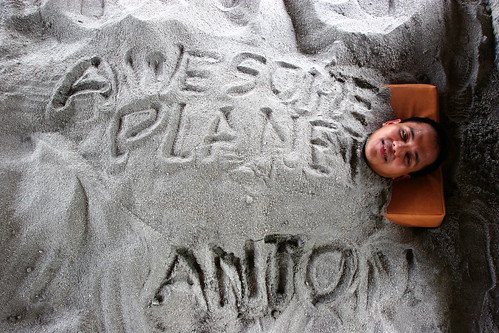The folklore of the two mountains was brought to light in print probably for the first time by writers like Isabelo de los Reyes who wrote El Folklore Filipino in 1887.
Pinatubo had been the constant focus of worship among the native Pinatubo Ayta up until today although these indigenous traditions have been fading since the volcano's eruption. One of the most important Ayta rites to Apo Namalyari (Apung Mallari), the deity of Pinatubo, is the "curing ritual" focused on bringing good health to the community.
Ayta guides thought usually perform a variety of rituals when taking visitors to the mountain including the annual "March for Peace and Tranquility" held on Nov. 30 to commemorate Pinatubo's eruption.
Kapampangan folklore involving Pinatubo and Arayat has come to the fore over the last century influencing many cults from both inside and outside Pampanga province. One of the most well-known sects revering Mt. Arayat are the Rizalistas, a group of organizations that worship national hero Dr. Jose Rizal as a divine being.
A female healer who claimed to be an incarnation of Mariang Sinukuan, a Tagalog take on the local Arayat deity, started an annual ritual in the 1940s honoring the national hero at the foot of the mountain every December.
Guerrilla bases
Both Pinatubo and Arayat are famed as bases for guerrilla fighters during different phases of Philippine history.
During World War II, Mount Pinatubo was the headquarters and one of the primary staging grounds for guerrilla operations during the Japanese occupation. The third president of the Philippine Republic, Ramon Magsaysay, was one of those guerrillas operating out of Pinatubo and later he named his presidential plane "Mt. Pinatubo." It was this plane that later crashed near Cebu killing the president.
Arayat was also used by guerrillas during World War II, and after the war became the main staging ground for the communist Hukbalahap movement led by Luis Taruc. Later, the New People's Army would use both Pinatubo and Arayat as bases of operation.
The tradition, in fact, goes even earlier for Felipe Salvador led a messianic movement against American colonizers with his headquarters on Mount Arayat during and after the Philippine Revolution.
Kamikaze shrines
The area between Pinatubo and Arayat was the location of the American strategic Clark airfield (later Clark Air Force Base), which was also used by the Japanese during World War II. It was from Clark Field and the linked Mabalacat airfield that the first Kamikaze missions of the war originated.
Today, two shrines exist in memory of the Kamikaze that are the focus of regular pilgrimages by Japanese tourists. One in the Lily Hill area of Clark consists of a statue of Kannon, the Japanese Goddess of Peace. Kannon is a variant of the Chinese boddhisattva goddess Kuanyin.

The 15 ft. high Goddess of Peace Shrine (Kannon) at Lily Hill, Clark Field in Pampanga, Philipines donated by Japanese Buddhists.
At Mabalacat, a tori and a statue of a Kamikaze pilot mark the spot of the first Kamikaze airfield, which been the site of ceremonies involving Japanese visitors hoping for world peace, but at the same time memorializing the suicide pilots.
 |
Quezon and Arayat
Manuel Quezon, the first Commonwealth president of the Philippines, took a liking to Mount Arayat and established an estate there.
He busily worked to convert Arayat into a tourist area, and he eventually declared an area at the foot of the mountain a national park.
Since the 1992 eruption, Pinatubo has also become a tourist destination. In addition to trekkers, health tourists come to Pinatubo for spa treatments. One well-known Korean-owned spa offers sulfur baths using Pinatubo ash as part of their treatment.

Volcanic ash treatment at Pinatubo spa
Maybe most interestingly, the Clark Field region between Pinatubo and Arayat is part of a plan to form a new constitution in the country. Current President Gloria Macapagal-Arroyo formed consultative groups to look into the possibility of the Philippines becoming a parliamentary system.
Dr. Jose Abueva, the head of the group tasked with writing the new constitution, offered a plan in 2006 for a federal republic that would transfer the national capital to Clark Field renaming the site "New Manila."
Regards,
Paul Kekai Manansala
Sacramento
We offer Mt. Pinatubo Expeditions, Taal Crater Lake tours, among other adventure packages.
ReplyDeletePlease contact me at 0920 952 5285 or email me at info@e-philippines.com.ph
Russell
www.e-Philippines.com.ph
explore. experience. enjoy. Philippines.